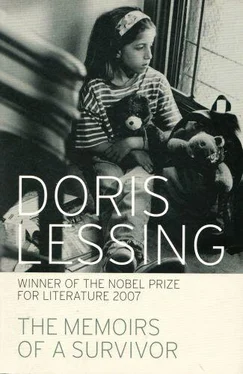From the possibility of which event I wanted to hurry on and away, instead of standing there, among rubbish, gazing up; particularly as I could see through the windows of the ground floor a couple of young men with guns: they guarded the building, or part of it, or just their own room, or rooms — who knew? But June, seeing them, exclaimed and called out and looked pleased — in the way she had of being pleased, as if every little event offered her undeserved riches of pleasure. With an apology to Emily for keeping her waiting ( my presence she had the greatest difficulty in remembering at all), in she went, while we two, Emily and I, stood there in a cloud of flies, watching a scene through a window of June being embraced and embracing — one of the two young men had visited in the Ryan house, which meant he had been almost part of the family. Now he gave her a dozen pigeons: the guns were airguns; the pigeons would come back — they had flown off as we arrived — and settle again over the rubbish where they had been feeding. We left, carrying the dead birds which would do for the household's next meal, hearing the silken whirring of many wings, and the pop, pop, pop of the airguns.
We crossed some old railway lines, flourishing now with plants, some of which Emily pulled up, as she passed, for medicine and flavourings. Soon we were at the side of the house. Yes, I had walked past it, out of curiosity, in my walks, but had never wanted to go in, fearing as always to encroach on Emily. Again June waved at a youth standing behind ground floor shutters that were half-open because of the heat, and again some weapon or other was put aside. We entered into a room which was very bare and clean — this struck me first of all, for I had not shed old associations with 'the Ryans'. No furniture at all, but there were curtains, and the shutters were scrubbed and whole, and mats and mattresses were rolled and stood along the walls. I was being taken from room to room on a rapid tour, while I looked for the communal rooms — dining-room, sitting-room, and so on. There was a long room for eating, with trestles and benches, everything scrubbed bare; but otherwise each room was self-sufficient as a workroom or as a home. We opened door after door on groups of children sitting on mattresses which were also beds; they were talking, or engaged on some task, and on the walls were hanging clothes and belongings. It could be seen that natural affinities and alliances had made, were making, of this community a series of smaller groups.
There was a kitchen, a large room where half of the floor had been covered with asbestos sheets and then corrugated iron sheets, where fires of whatever fuel was available could bum. There was a fire burning now, and a meal being prepared by two youngsters who, when they saw it was Emily, stood aside to let her taste and examine: it was a stew, made of meat substitute with potatoes. She said it was good, but what about a few herbs, and offered them the handfuls she had gathered off the railway lines. And here were some pigeons: they could pluck them if they liked, or otherwise find somebody who would like an extra task — no, she, Emily would find someone and send them to do it.
I understood now what I had half-noticed before: the way the children reacted when they saw Emily: this was how people respond to Authority. And now, because she had criticised the stew, a boy knelt and chopped the greenstuff on a board with a piece of sharpened steel: he had been given an order, or so he felt, and was obeying her.
Emily's eyes were on me: she wanted to know what I had seen, what I made of it, what I was thinking. She looked so worried that June instinctively put her hand into Emily's and smiled at her — all this was such a sharp little presentation of a situation that I did not avoid it by pretending I had noticed nothing.
Only a few days before Emily had come in late from this household, and had said to me: 'It is impossible not to have a pecking order. No matter how you try not to.' And she had been not far off tears, and a little girl's tears at that.
And I said: 'You aren't the first person to have that difficulty!'
'Yes, but it isn't what we meant, what we planned. Gerald and I talked it over, right at the start, it was all discussed, there wasn't going to be any of that old nonsense, people in charge telling people what to do, all that horrible stuff.'
I had said to her: 'Everybody has been taught to find a place in a structure — that as a first lesson. To obey. Isn't that so? And so that is what everybody does.'
'But most of these children have never had any education at all.'
She was all indignation and incredulity. A grown-up — a very grown-up and responsible — question she was asking: after all, it is one that most adults never ask. But what had confronted me there had been a young girl in whose eyes kept appearing — only to be driven down, fought down — the needs of a child for reassurance, the sullen reproach against circumstances of a very young person, not an adult at all.
'It starts when you are born,' I said. 'She's a good girl. She's a bad girl. Have you been a good girl today? I hear you've been a bad girl. Oh she's so good, such a good child… don't you remember ?' She had stared at me; she had not really heard. 'Its all false, it's got to do with nothing real, but we are all in it all our lives — you're a good little girl, you're a bad little girl. 'Do as I tell you and I'll tell you you are good.' It's a trap and we are all in it.'
'We decided it wasn't going to happen,' she said.
'Well,' I had said, 'you don't get a democracy by passing resolutions or thinking democracy is an attractive idea. And that's what we have always done. On the one hand 'you're a good little girl, a bad little girl', and institutions and hierarchies and a place in the pecking order, and on the other passing resolutions about democracy, or saying how democratic we are. So there is no reason for you to feel so bad about it. All that has happened is what always happens.'
She had got to her feet: she was angry, confused, impatient with me.
'Look,' she said. 'We had everything so that we could make a new start. There was no need for it to get like it's got. That's the point, I'm afraid.' and she had gone off to the kitchen, to get away from the subject.
And now she was standing in the kitchen of her, or Gerald's, household, angry, confused, resentful.
That child hurrying over his task, not looking up because the overseer still stood there and might criticise — this humiliated her, 'But why,' she whispered, staring at me, really — I could see — wanting an answer, an explanation. And June stood smiling there beside her, not understanding, but gazing in pity at her poor friend who was so upset.
'Oh all right, never mind!' said Emily at last, turning away from me, June, the scene and going out, but asking as she went: 'Where's Gerald? He said he would be here.'
'He went with Maureen to the market,' said one of the children.
'He didn't leave a message?'
'He said we must tell you that we must have our heads done today.'
'Oh he did did he!' But then, already relieved of her distress, she said: 'Right, tell everyone to get to the hall.' And she led the way to the garden.
It was a fine garden in every way, planned, prepared, organised, full of good things all for use — potatoes, leeks, onions, cabbages, the lot — and not a weed or a flower in sight. Some children were at work there, and as they saw Emily they quickened their pace of work.
Suddenly she exclaimed: 'Oh, no, no, I said the spinach should be left until next week, it's being overpicked.' A child of about seven quite openly grimaced at June — it was that face which is made to say: Who does she think she is, bossing us? — that absolutely routine reaction, to be observed in one form or another anywhere there are groups, hierarchies, institutions. In short, everywhere. But Emily saw it, suffered, and softened her voice: 'But I did say leave it, didn't I? Can't you see for yourself? The leaves are still tiny.'
Читать дальше
Конец ознакомительного отрывка
Купить книгу












